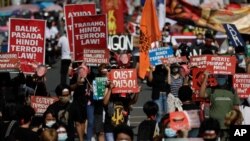Philippine President Rodrigo Duterte’s office Wednesday denied a claim made this month by the international rights group Human Rights Watch that drug-related killings by the country’s police have grown substantially during the anti-coronavirus shutdowns.
The advocacy group said in a September 8 report that extrajudicial killings, a hallmark of Duterte’s campaign against illegal drugs, rose 50% from April, when lockdowns began, through July, compared to the previous four months.
The claim raises questions about how that's possible and resurrects one of the country’s stickiest issues during an already tough pandemic.
Human Rights Watch says 155 people were killed by law enforcement from April through July, up from 103 December to March. The anti-drug campaign has caused the death of at least 5,810 suspected dealers and users during police operations since 2016, the group says.
'Gross distortions'
Duterte’s office Wednesday called the report “gross distortions” based on “unqualified and unverified data.”
The presidential office rebuttal of the Human Rights Watch statement does not offer competing data for the April-July span but says the government is committed to “lawful enforcement operations” during the pandemic.
“We reject sweeping allegations of state-sanctioned extra judicial killings that have resurfaced with unfounded allegations,” the presidential office statement says.
Data on killings come from public government records, Human Rights Watch says.
“Sadly, the Presidential Communication Operations Office spin doctors are apparently more interested in scoring political points than making a factual argument,” the rights group’s deputy Asia director, Phil Robertson, told VOA Thursday.
“It’s frankly absurd to disparage Human Rights Watch’s analysis while failing to provide any evidence of any factual mistake on our part,” he said.
'They think they can get away with it'
Killings may have risen during shutdowns as police take more control of the streets to enforce stay-home orders, analysts in the Southeast Asian country say. Any excess police force would be more likely to go unnoticed because fewer people go outside overall, they add.
“They are empowered now even more than before – they can effect arrests of quarantine violators,” said Renato Reyes, secretary-general of the Manila-based Bagong Alyansang Makabayan alliance of leftist causes. When it comes to any police killings, he said, “they think they can get away with it, because nobody’s looking and the whole environment is militarized.”
In Metro Manila, an urban mass of 12.9 million that includes the Philippine capital, drug dealers would be particularly obvious because of the myriad police checkpoints set up to enforce stay-home orders, said Aaron Rabena, research fellow at the Asia-Pacific Pathways to Progress Foundation in Metro Manila.
“Because there are so many checkpoints now in Metro Manila, it’s easier to find these people,” Rabena said. “There’s increased police visibility, so along the way they might have encountered these drug mules.”
The advocacy group’s findings shed new light on an issue that dogged Duterte earlier in his now-4-year-old presidency. The tough-talking leader who once pledged to eradicate drug crimes within six months had drawn rebukes from Western government and United Nations officials because of reports that police were killing suspects without trial.
'People identified as leftists'
As his popularity rose at home on perceptions that the anti-drug campaign had made streets safer, Duterte lashed out at opponents overseas, including former U.S. President Barack Obama. In 2017, the Philippine leader toned down the anti-drug crackdown following domestic protests over the killings of teenagers.
Stepped up stay-home patrols, coupled with an anti-terrorism act that was finalized in July, give police more leeway to kill not only drug suspects, said Maria Ela Atienza, political science professor at the University of the Philippines Diliman.
They’re going after “people identified as leftists” and supporters of the country’s communist movement, she said. The Communist Party of the Philippines maintains a militia that occasionally kills soldiers.
“It means that some of the major programs or policies or the government still continue even during the pandemic,” Atienza said.
Lockdowns in Metro Manila relaxed in August, although malls and restaurants accept fewer people than before the pandemic, and Filipinos under 20 or over 60 years old are still asked to stay home.
The Philippines has reported more COVID-19 cases than other Southeast Asian countries because of weak social distancing practices. The total caseload stood at 276,289 as of Friday.




